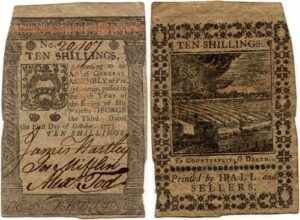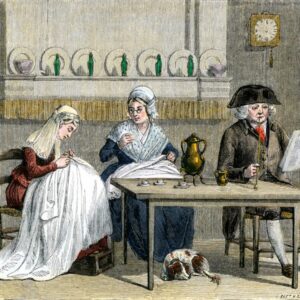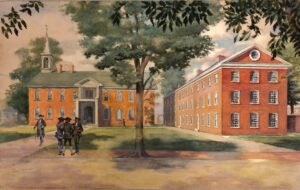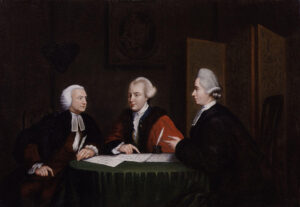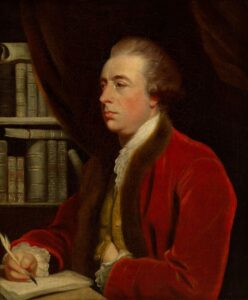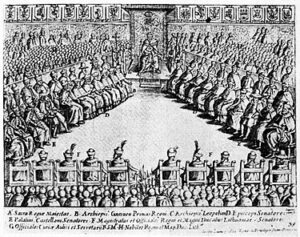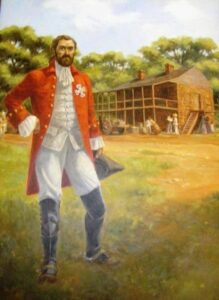Americanism Redux
October 5, your today, on the journey to the American Founding, 250 years ago, in 1773
It’s coming. On the water.
A Boston newspaper reprints a letter cited in a Philadelphia newspaper. The reprinted letter describes shipments of tea leaving England bound for Philadelphia, Boston, and New York City. A ship operator has refused to carry the tea but other ship captains were easily found to transport the cargo. News of the ocean-going tea has rocketed from place to place within the three cities, including taverns, shops, marketplaces, courthouses, and churches as well as villages adjacent to the communities.
Thomas Wharton in Philadelphia puzzles over the problem of tea. As a business owner and holder of local public offices, Wharton sees both sides of the argument–the pro-Tea Act and the anti-Tea Act groups. He also knows that the motives for declarations made by groups can often be hidden and concealed and not at all in line with their pronouncements. Wharton expects that the men who will be named as “agents” for distributing the East India Company’s product in the colonies will meet together in a conference for planning a consistent course of action. Beyond that, however, he just can’t quite discern how colonists will react when the ships arrive with the tea chests. It’s the beyond that worries him the most.
Another Thomas in another British colony thinks about another product stored on board a water-going vessel. He’s Thomas Oliver in Marlborough, colony of Virginia. He’s know winter is not far off. Oliver suddenly remembered he hadn’t ordered a boat shipment of the “best flour” until now. He breathes a sigh of relief because had he waited much longer autumn would be over and ice would cover the rivers. Wait too long and you’ll be stuck.
(recreating a shipment that in October 1773 was a hundred nautical miles closer each day)
* * * * * * *
It’s coming. To your purse and pocket.
The colonial government of Pennsylvania releases to the public today L150,000 of British currency, or bills of credit. The paper credit is printed by Hall and Sellers in Philadelphia. Attention has been paid to ensure the public has confidence in the paper—designs by Benjamin Franklin are used to prevent counterfeiting, a problem in the economy of neighboring colony New Jersey; also, on one side of the paper is a coat of arms to represent longevity and stability, while the other side has a drawing of a well-kept farm field to symbolize local Pennsylvania identity.
(conveying an image to its users)
* * * * * * *
It’s daylight. Get to work.
That’s the phrase starting every day for most working people in the British colonies, or anywhere else in the world, for that matter. Unless you’re wealthy, it’s a clockless life. Sun comes up, get out of bed, the work day is off and running.
The rising sun at Thomas Jefferson’s central plantation of his 5000-acre holdings in the colony of Virginia shines on approximately 150 working people, most enslaved, some free. One of the latter is George Manly, 34-years old of mixed black and white parentage, who had been “bound out”—working without freedom until last year when Jefferson discovered he’d been forced to work for three years past his agreed-upon end date. Jefferson had volunteered to become Manly’s attorney and secure his release, which he did. Manly now does a variety of “odd jobs” around the plantation and today, he’ll likely see Isaac Jackson, also another “odd-job” free worker of black and white parentage and still another person who’s reached the mandated freedom age of 31. Tomorrow, Manly and Jackson will see the newest member of Jefferson’s assorted workforce—Thomas Walker, a prison convict who sees his jail term converted into an indentured-servant agreement. Walker’s skill as a furniture maker is what drew him to Jefferson’s eye. Monticello’s working population is a conglomeration of freedom denied, freedom delayed, and freedom declared.
(on Mulberry Row, Monticello, a living quarters of an enslaved worker and a sight known to our trio)
9-year old Katharine White, begins work today as an “indentured servant” to Dr. Nathaniel and Eleanor Coffin, in Falmouth, colony of Massachusetts (now Maine). Young Katharine is from a poor family. The Coffins and the “Overseers of the Poor” in Boston agree this is best for her. She’ll work for the Coffins in exchange for learning how to read, write, and sew and weave fabric. Nine years from now, in 1782, she’s set to be free as an 18-year old woman with a skill and basic literacy.
What will the world look like when Katharine reaches her age of freedom? An exciting question with a far-off answer.
(like Katharine’s arrangement)
* * * * * * *
It’s daylight. Clean up from last night.
Well, a couple nights ago actually, in Philadelphia. The College in Philadelphia held its commencement ceremony for graduating students. Everyone is still buzzing with excitement about the gala event. All the important people in attendance. Women in beautiful gowns. Men in shining suits. Grand music and even grander speeches. It’s the best and most fashionable scene the city can offer—nothing at all like the homey, rural, farm-like setting etched on the back of the newest Pennsylvania money. Some people strained so that they could be there and be seen there. The Virginian Henry Lee is one of them, a stiff coat collar stitched in gold lace digging into his neck. Smile and wave, Henry, your future grandson Robert E might hear about you in this glorious moment. But for now, in the harsh light of morning, the music is done, the dances are over, and all that’s left is to sweep up the floors and put away the chairs. Better get some men to do these “odd-jobs.”
(The College of Philadelphia at a quieter time)
Along a cobblestone street, near the College, lays a newspaper with the description of the tea shipments en route to Philadelphia. Perhaps tea will be served at next year’s College gala.
Maybe that explains all the hushed and intense tones whenever the topic of tea comes up today in Philadelphia.
Also
A small group in London, England has recently concluded a meeting. These Londoners belong to the “Society of the Bill of Rights.” They are followers of John Wilkes, a member of the British Parliament who demands change to promote more freedom and liberty in the British governing system. The Society has just voted to include its newest member, a “Gentleman of America”. The designation is largely honorary, a sort of award, because no one knows if this Gentleman will ever leave America to visit England. This newest Society member is John Adams, a work-a-day attorney from Braintree, colony of Massachusetts and passionate believer in British rights and liberties wherever they may be found.
(Wilkes is in the center, object of the Society that designated John Adams as its newest member)
More broadly in London, the English reading public can’t make up their minds about the three-volume book series written by John Hawkesworth. He has tried something new with his “An Account of the Voyages Undertaken by the Order of His Present Majesty for Making Discoveries in the Southern Hemisphere.” Hawkesworth has assembled several different writings made by explorers but has used the first-person “I” in sharing their accounts as a singular story. He’s trying to introduce a new form of writing style into what has been a rigid template for expressing nautical information. If readership awareness and interest increase, it will have been worth it, in Hawkesworth’s view.
(John Hawkesworth, pushing beyond boundaries in nonfiction writing)
Let’s hope the day-old Symphony No. 24 written by 17-year old Wolfgang Mozart fares better in the public arena. He finished writing it yesterday. He’s learned much from the music of Haydn during time he lately spent in Vienna. With a tone and arrangement so mindful of Italian music, this latest symphony of young Wolfgang might reflect his interest in pleasing a wealthy music lover living in Milan, Italy. Unlike Hawkesworth, Mozart’s ambition lies not in pointing to new trails but rather in seeking perfection with an established form.
(Wolfgang Mozart, perfecting within boundaries in classical music)
In Poland, the trails are cold and the only music anyone wants to hear is a funeral dirge. Today, the Sejm, the lower house of the legislature in the commonwealth of Poland-Lithuania, has approved the “occupied territories” seized by Prussia, Russia, and Austria will no longer be part of Poland. Those politicians who opposed the arrangement were threatened by the Russian ambassador with jail, property confiscation, execution, or exile. It’s a dark day for the group in Poland that desires national unity, more freedom, and a greater voice in self-government.
(a meeting of the Polish Sejm, 17th century)
Spanish officials in Madrid, Spain will receive yet another petition written today from New Spain in the New World. 44-year old Antonio Gil Y’Barbo writes a petition to Spanish officials seeking approval for him, his wife, and children to return to the Trinity River and Lobanillo Creek where he’d lived for many years. The presidios and missions of eastern Texas, province of New Spain in the Spanish Empire, have been closed for several weeks by royal decree. Y’Barbo wants to loosen the knots of empire to allow for a better life for his family and the people around them. Not cut or untie or unravel. Just loosen.
(Antonio Gil Y’Barbo)
For You Now
Honestly, there’s a street-side quote that comes to my mind right now. We’ve got old social gatherings in need of clean-up, various people striving to survive somewhere in the Forced Labor Continuum (as I call it), other people receiving honors they know nothing about it or accomplishing honor-worthy projects, and nations in fluctuating conditions of power and powerlessness. Regardless of all these things, one sentence clangs in my head:
“The s–t just got real.”
(tangibility)
That’s what I’m feeling. We’ve gone from the tea issue as Parliamentary debate to imperial law to chests on seven ships cruising toward the four major colonial ports. It was an intellectual and academic exercise back when the trees had flowered. It was entirely different, entirely more material and tangible—and thus immediate and threatening—when the leaves were red and gold and dropping to the ground. It got real and was getting more real by the day. Nothing screams reality like a naked tree in the cold night.
They know what they know—a) the EIC has succeeded in working with an imperial government to get a sweetheart deal; b) the deal consists of insiders getting privileged arrangements to buy and sell tea, a beloved daily beverage, directly to colonists with prohibitions on competitors doing the same thing; c) punishment for any violations and violators, and d) all of it happened without input or influence by British colonists.
Not every colony has the intense political hatred currently true in Boston and Massachusetts swirling around the governor and lieutenant governor. But every colony has tea-drinkers, tea-sellers, and tea-whatevers persuadable to see the new reality in the worst light.
The spit got real.
Remember, I say that history rhymes.
Suggestion
Take a moment to consider this: in our America of 2023 heading toward 2026, is there something of serious concern that is “not yet real but one day soon will be real?”
(Your River)

